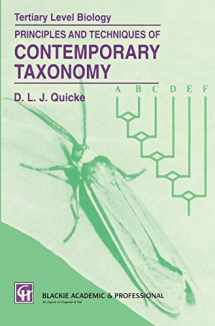
Principles and Techniques of Contemporary Taxonomy (Experimental and Clinical Neuroscience)
ISBN-13:
9789401049450
ISBN-10:
9401049459
Edition:
Softcover reprint of the original 1st ed. 1993
Author:
Donald L. J. Quicke
Publication date:
2013
Publisher:
Springer
Format:
Paperback
323 pages
FREE US shipping
Book details
ISBN-13:
9789401049450
ISBN-10:
9401049459
Edition:
Softcover reprint of the original 1st ed. 1993
Author:
Donald L. J. Quicke
Publication date:
2013
Publisher:
Springer
Format:
Paperback
323 pages
Summary
Principles and Techniques of Contemporary Taxonomy (Experimental and Clinical Neuroscience) (ISBN-13: 9789401049450 and ISBN-10: 9401049459), written by authors
Donald L. J. Quicke, was published by Springer in 2013.
With an overall rating of 3.5 stars, it's a notable title among other
books. You can easily purchase or rent Principles and Techniques of Contemporary Taxonomy (Experimental and Clinical Neuroscience) (Paperback) from BooksRun,
along with many other new and used
books
and textbooks.
And, if you're looking to sell your copy, our current buyback offer is $0.3.
Description
Taxonomy is an ever-changing, controversial and exCitmg field of biology. It has not remained motionless since the days of its founding fathers in the last century, but, just as with other fields of endeavour, it continues to advance in leaps and bounds, both in procedure and in philosophy. These changes are not only of interest to other taxonomists, but have far reaching implications for much of the rest of biology, and they have the potential to reshape a great deal of current biological thought, because taxonomy underpins much of biological methodology. It is not only important that an ethologist. physiologist. biochemist or ecologist can obtain information about the identities of the species which they are investigating; biology is also uniquely dependent on the comparative method and on the need to generalize. Both of these necessitate knowledge of the evolutionary relationships between organisms. and it is the science of taxonomy that can develop testable phylogenetic hypotheses and ultimately provide the best estimates of evolutionary history and relationships.


We would LOVE it if you could help us and other readers by reviewing the book
Book review

Congratulations! We have received your book review.
{user}
{createdAt}
by {truncated_author}


